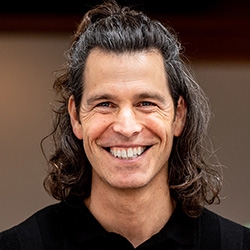
Search Results: connection
-
Trainer tip: Do you get into “right fights”? You know you’re in one when you’re arguing with somebody in order to be right or because you want to win. What needs do I hope to meet from winning or being right? Notice if you enter into a right fight today and shift your focus to your needs and connecting with the other person's needs.
-
Jim leads a self-connection exercise focused on how our lives are interwoven with people we love, acquaintances, people unknown to us, and even those who have come before us or will come after us.
-
Connection requests focus on the quality of connection between people instead of on any particular strategy or solution. While the core motivation for a connection request may be connection with the other person, varied internal states and needs may help guide us toward different types of connection requests. Self-connection and understanding of our motivation in making a connection request can therefore greatly support our capacity for discovering and articulating what specifically we want from the other person that we believe may contribute to connection.
-
Join Jim Manske as he leads you through a self-connection exercise to guide you toward welcoming whatever enters into your awareness.
-
Human health is connected to health of ecosystems and other societies. Our wellness and liberation is found in our interconnection, kinship, reverence for life, and solidarity. Solidarity erodes through narratives, practices and policies that separate us from each other -- and this impacts societal functioning. The breakdown creates conditions for pandemic, racism, police brutality, exploitation in untold numbers, and extinction. Read on for how all is connected.
-
How do our nervous systems sync during connection, and what happens when disconnection occurs? In this Sarah Peyton video, we explore the profound interdependence of human relationships through the lens of Nonviolent Communication (NVC).
-
Yoram Mosenzon discusses judgmental dialogue and its hidden aim to meet needs. This often creates distance instead of fostering connection. Yoram introduces a self-connection exercise to improve the chances of dialogue becoming more enriching and life-serving.
-
Learn to recognize four forms of thinking and speaking that are likely to lead to disconnection.
-
In most business environments, purpose holds a higher priority than connection. Listen to Miki discuss the strategy of using minimum connection to remain true to the purpose at hand, and how the purpose of empathy may differ in the workplace.
-
Use this exercise to stay in dialogue and connect to needs while facing a “no”. Identify a situation where you have low confidence that you'll get your needs met, and it'll be hard hearing a “no” to your request. Explore your response to the “no” by working with feelings, needs, request and alternate strategies. Thus you can work towards meeting your needs while also releasing the idea that your needs “have to” be met.
-
Expressing ourselves honestly is sometimes scary because we can't predict where the conversation will go after we've made ourselves vulnerable. This recording will demonstrate how the power of our honesty is enhanced by ending on a clear and present request.
-
Mary Mackenzie shares how Marshall Rosenberg's Four D's of Disconnection live in her. Join Mary and learn how you can reframe the 4 D's to enhance connection.
-
True inner freedom arises from self-connection. Without self-connection, we're mostly acting from habits, and those habits do not necessarily attend to our own needs. Here's a practice you can explore in your daily life to deepen your relationship with yourself, and experience true choice and inner freedom.
-
CNVC Certified Trainer Stephanie Bachmann Mattei leads you through an 8 minute meditation designed to develop a more integrated body and feelings/needs awareness.
-
-
Discover how fostering strong attachment and connection with your child can lead to fewer conflicts and more harmonious interactions. Ingrid Bauer offers practical guidance on using empathy, self-connection, and consistent care to create a secure and loving environment for your child.
-
In this insightful snippet from Sarah Peyton, discover how connecting requests can transform conversations into meaningful exchanges. Referred to as the "steering wheel" of NVC dialogue, connecting requests shift the focus from action to connection, creating clarity and understanding.
-
We all blow it sometimes. Maybe we are triggered and react in ways we regret. Or we unknowingly say or do something that unexpectedly touches a nerve for someone else. Either way, how do we heal the disconnection? In this session, you'll learn how to integrate skills for repairing relationships.
-
Here are two practices for connecting with "request energy". One of them helps us practice in the moment (7 steps). The other one helps us connect to ourselves (11 steps).
-
When we're judging we're less able to access both what we care about and constructive next actions. Instead, create more internal space and agency starting with connecting to your feelings and needs; then feel your grief or disappointment; followed by getting curious about the other party's needs and context -- and then based on collective needs and the long term effects make requests or take aligned action that works for all.




















